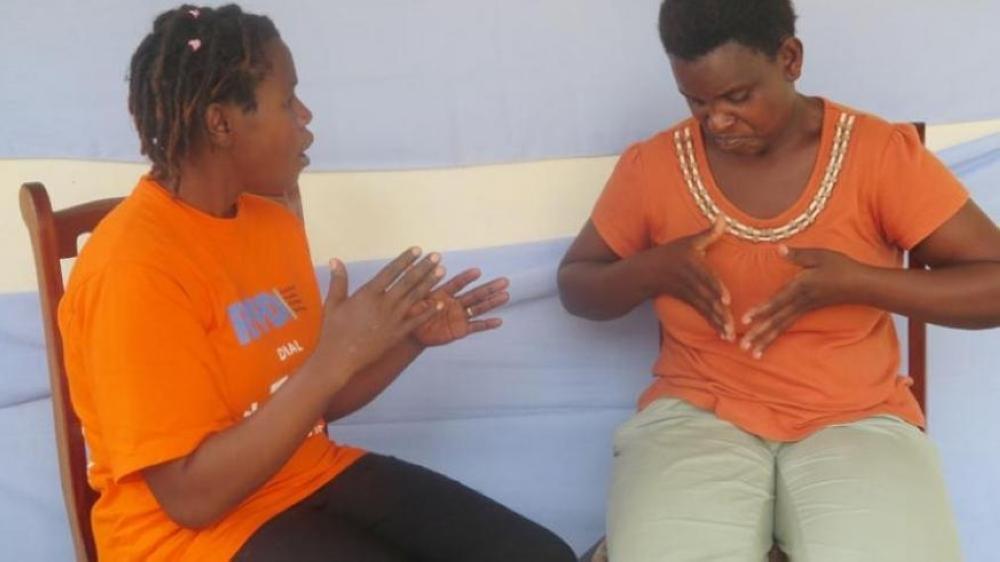Africa-Press – Rwanda. The government is distributing the first-ever comprehensive Rwandan Sign Language Dictionary (RSLD) to ensure the deaf community countrywide communicates easily and participates fully in society, officials told The New Times.
The dictionary, a product of research and collaboration between the National Council of Persons with Disabilities (NCPD) and Rwanda National Union of the Deaf (RNUD), is being distributed to institutions nationwide as part of an ongoing awareness campaign.
Emmanuel Ndayisaba, the Executive Secretary of NCPD, said that: “We have printed 100 copies of the dictionary, which were officially released on the International Day of Sign Languages on September 23.
“These copies have begun reaching key institutions, with additional copies planned.”
The journey to develop the RSLD began in November 2014, driven by a commitment to create a resource that is linguistically grounded and tailored to the needs of Rwanda’s deaf community.
Supported by local and international partners including the Ministry of Local Government, the Ministry of Education, and USAID, the dictionary includes sections on numbers, daily expressions, and a preface that outlines Rwanda’s legal framework for persons with hearing disabilities, alongside the history of the deaf community in the country.
Although the initial print run is a solid foundation, Ndayisaba acknowledged that it is insufficient to meet the national demand.
“We are assessing requests from various institutions to determine how many more copies are needed. Our goal is to ensure accessibility across sectors such as education, healthcare, justice, and public service,” he explained.
Ndayisaba noted that institutions that have already received copies include Rwanda Basic Education Board (REB) and other schools under the Ministry of Education, which focus on inclusive and special education.
He added that University of Rwanda’s College of Education is also integrating the dictionary into its curriculum.
“The dissemination plan is designed to target areas with communication barriers, such as health facilities, schools, police stations, and the military. We advocate for sign language training in these sectors so that staff can effectively communicate with individuals who are deaf or hard of hearing,” Ndayisaba added.
He stressed that the RSLD is not only a communication tool but a step toward recognising sign language as an official language in Rwanda.
Ndayisaba said that discussions with various government entities are already underway, with the need for legal backing.
“Our Constitution provides for making a new language official if deemed necessary by citizens. We believe the time has come for Rwandan Sign Language to receive this recognition,” he said.
Augustin Munyangeyo, the Chairperson of the Rwanda National Union of the Deaf, stressed that sign language is for the empowerment of individuals with hearing impairments.
“Without it, they cannot fully participate in society,” Munyangeyo noted through an interpreter.
He also noted that official recognition of sign language would enhance inclusion in education, healthcare, and justice sectors. Efforts to digitize the Rwandan Sign Language Dictionary are underway, with NCPD collaborating with IT specialists to create a digital version accessible on smartphones and computers.
“We aim to make learning sign language as accessible as possible. A digital dictionary will allow individuals to self-teach the basics of Rwandan Sign Language,” Ndayisaba explained.
He noted that to support the practical use of the dictionary, NCPD conducted training sessions for staff at various institutions. The first of these sessions took place in February, with more planned in the coming months.
Ndayisaba noted that raising awareness and securing funding to expand the programme are some of the challenges.
“Advocacy is essential. We must ensure everyone understands the importance of sign language in fostering an inclusive society,” he said.
Jean-Claude Sabato, the Gender and Disability Inclusion Specialist for USAID’s Tunoze Gusoma activity, said that teachers from 84 special and inclusive schools have so far received the dictionary. He noted that each dictionary contains 2,000 signs to enhance literacy education for deaf students.
“We trained teachers on how to integrate the dictionary into their teaching. Many teachers had no prior knowledge of sign language, but through practice, they learned to sign,” Sabato said.
The training, held on September 23 and 24 in Muhanga District, included 180 educators, such as primary school teachers and special needs education tutors.
“Teachers prepared lessons in sign language and taught them. It was encouraging to see support from deaf facilitators who assisted when challenges arose,” Sabato added.
He stressed that digitalization of the dictionary is progressing, with ongoing efforts to boost accessibility.
“We are working on a digital sign language dictionary platform to aid professionals in effective teaching. This is in support of NCPD and RNUD, in collaboration with various partners,” he stated.
Sabato acknowledged the need for more signs, noting that while the dictionary includes 2,000 words, some Kinyarwanda terms lack corresponding signs, stressing that the deaf community is actively working to harmonize local signs and develop additional entries. Teachers are expected to share the training insights within their schools, equipping others to utilize the dictionary in literacy development for deaf students, he noted.
Jean-Sauveur Niyorumuri, a special needs education tutor at SAVE Teacher Training College in Gisagara District, commended the sign language training’s organization and the availability of materials.
“After the two-day training, we received a sign language dictionary which will assist us in teaching our students effectively, providing necessary resources for teaching and learning,” Niyorumuri noted.
He believes that the dictionaries will improve communication with the deaf community, removing barriers to interaction.
For More News And Analysis About Rwanda Follow Africa-Press






